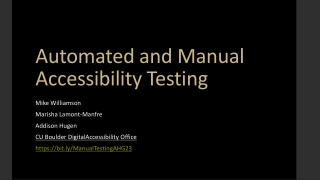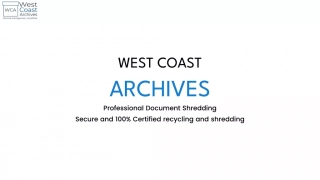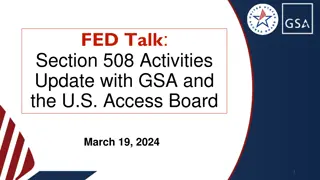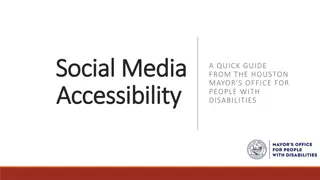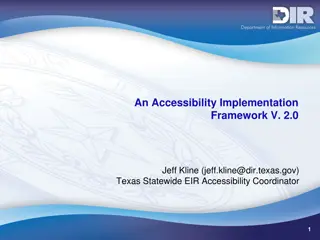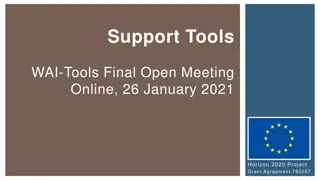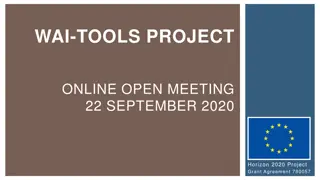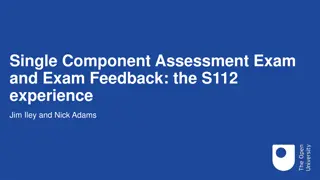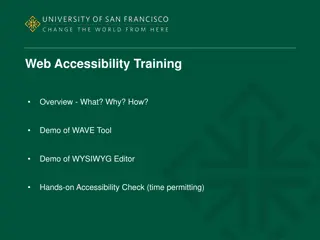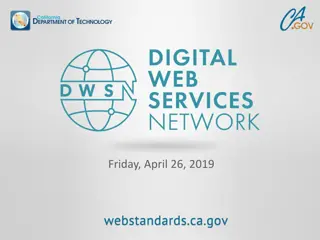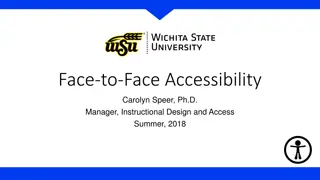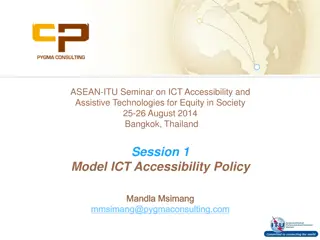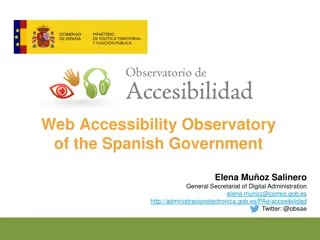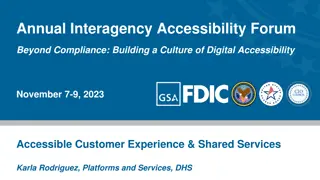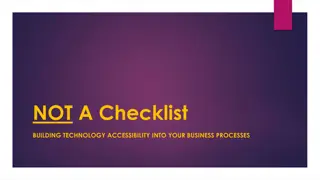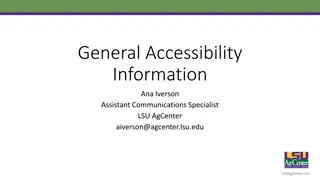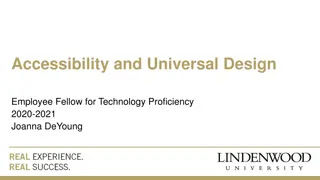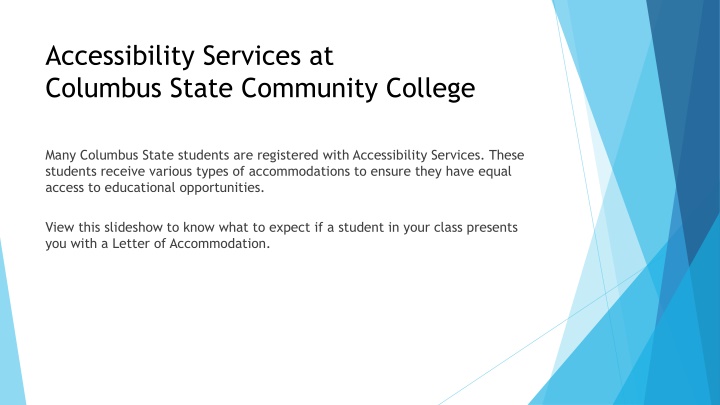
Supporting Students with Disabilities at Columbus State Community College
Columbus State Community College provides Accessibility Services (AS) to support students with disabilities, offering various accommodations to ensure equal access to educational opportunities. The AS program adheres to the Americans with Disabilities Act and the Rehabilitation Act of 1973, promoting Universal Design and advocating for Inclusive Design principles. Through these services, students with disabilities receive necessary support to thrive in their educational journeys.
Uploaded on | 0 Views
Download Presentation

Please find below an Image/Link to download the presentation.
The content on the website is provided AS IS for your information and personal use only. It may not be sold, licensed, or shared on other websites without obtaining consent from the author. If you encounter any issues during the download, it is possible that the publisher has removed the file from their server.
You are allowed to download the files provided on this website for personal or commercial use, subject to the condition that they are used lawfully. All files are the property of their respective owners.
The content on the website is provided AS IS for your information and personal use only. It may not be sold, licensed, or shared on other websites without obtaining consent from the author.
E N D
Presentation Transcript
Accessibility Services at Columbus State Community College Many Columbus State students are registered with Accessibility Services. These students receive various types of accommodations to ensure they have equal access to educational opportunities. View this slideshow to know what to expect if a student in your class presents you with a Letter of Accommodation.
Accessibility Services Accessibility Services (AS) offers a wide range of support services and accommodations to Columbus State students with documented disabilities. AS at CSCC exists to provide accommodations for students with documented disabilities as mandated by: The Americans with Disabilities Act of 1990 (ADA) The Rehabilitation Act of 1973
The Americans with Disabilities Act The ADA law ensures that people with disabilities have equal access to public services and programs. At Columbus State this means that we are required to make college as accessible for students with disabilities as it is for students without disabilities.
The Rehabilitation Act of 1973 The Rehabilitation Act of 1973 is generally viewed as the first civil rights legislation for people with disabilities at the national level. Section 504 of the Rehabilitation Act is a program access statute, which means it prohibits discrimination on the basis of disability in any program or activity offered by an entity or institution receiving federal funds. Since 1977, all institutions receiving federal funding, including CSCC, must be prepared to provide appropriate academic adjustments and reasonable modifications to policies and practices for people with disabilities.
AS promotes the concept of Universal Design Universal Design is the design of products and environments to be usable by all people, to the greatest extent possible, without the need for adaptation or specialized design. Universal design has the unique quality that when done well is invisible. -Ron Mace
Accessible vs Inclusive Design Accessible Design means: Instruction and products/ buildings that are accessible and usable by people with disabilities. Inclusive Design means: Instruction and products/buildings that are accessible and usable by everyone, including people with disabilities. Accessibility Services supports the idea Inclusive Design.
Faculty Obligations Adhere to the Laws Students can request accommodations at any point during the semester as long as their request is reasonable and in a timely manner. Students should expect to receive assistance in a timely manner. Please provide accommodations as necessary. Design Materials and Class Interactions to be Accessible Students have a right to accessible class content. Content and activities should be in a format students can utilize to complete all required work and to enable participation with [How to Create Accessible Syllabi] [How to Create Accessible Syllabi] their peers as required. [How to Create Accessible Syllabi] Design materials and class interactions that are useable by all without the need for accommodation. e.g. Provide videos with captioning/subtitling so that they can be utilized by anyone at any time, with no delay in providing the content (for post captioning production). Design Materials and Class interactions to be Inclusive Utilize the AS office for insight on how to make classes accessible, inclusive, and useable by all students. Seek Help
Eligibility To receive services through Accessibility Services, students must be eligible. Learn more about eligibility.
Eligibility (continued) To become eligible for services, students need to provide Accessibility Services with verification of their disability (i.e. documentation) that includes: the disability history/diagnosis, including restrictions and limitations how the disability affects the student in an academic setting strategies and recommendations to lessen impact of disability
Disability is defined as: A mental or physical condition which substantially limits a major life activity. Major life activity: A "major life activity" includes an everyday type of activity like walking, sitting, standing, seeing, hearing, eating, sleeping. It also includes difficulty in many major body systems, such as: neurological impairment; problems with circulatory, respiratory, immune and digestive functions. This is not an inclusive list, but gives a general idea of the types of conditions covered by the ADA. A documented impairment in any of these activities can qualify an individual for services under the Americans with Disabilities Act. Substantially limits: Significant restriction(s) compared to the condition, manner, or duration under which the average person in the general population can perform that same major life activity.
Students we serve have various disabilities, including the following: Deaf or Hard of Hearing Autism Spectrum Disorders Learning Disabilities Attention Deficit Disorders (ADD and ADHD) Psychiatric Conditions Blind or Low Vision Medical Disabilities Mobility Limitations As the Instructor, you may encounter some students with noticeable disabilities and others with "invisible disabilities."
Getting registered with Accessibility Services usually takes about 2-3 weeks. The process is as follows: The student submits verification of disability to AS 1. Submitted information is reviewed by AS Advocates 2. The student meets with a AS Advocate for Intake appointment 3. After the Intake, the student is officially registered and approved for services and accommodations 4. The student receives a Letter of Accommodation (usually 1 to 3 business days after the Intake appointment) 5. The student requests services and accommodations from the Instructor 6.
Please note that it is the students responsibility to: Register with the AS office to become approved for services and accommodations. Communicate with you, the instructor, to request accommodations for their classes. (This communication should include presenting you with a copy of their Letter of Accommodation, which is described on the next slide.) Request accommodations in a timely manner.
Letter of Accommodation Students will provide you with a Letter of Accommodation (LOA) as verification that they are registered with Accessibility Services. You may be given a paper copy of a student s Letter of Accommodation, or the student may email you a pdf copy. Instructors are not required to provide specific accommodations unless they are specifically listed on the student's letter, even if a student reports needing these accommodations. Instructors may address other student requests but will not be asked by AS to alter the design of the course or change the goals of the class. If you are unsure whether or not to grant a requested accommodation, please consult with AS.
Accommodations Any accommodation a student has been approved for is justified by the information presented in their disability documentation. Services and accommodations can include, but are not limited to: Testing Accommodations Sign Language Interpreting and Captioning Alternate Media Note-taking Assistance Assistive Technology and Equipment.
Testing Accommodations The Department of Accessibility & Testing provides testing accommodations, including but not limited to: Double Testing Time Private Room Distraction-Reduced Testing Space Tests in an Alternate Format (Enlarged Print, Audio, Braille, etc.) Assistive Technology Software/Hardware
Submitting Tests to Accessibility & Testing If proctoring assistance is needed, all testing materials must be submitted via RegisterBlast at least three (3) business days prior to the test availability date and received prior to closing for processing to begin. Exams submitted after hours will be dated as being received the following business day. Saturdays and Sundays are excluded. If you are submitting an academic test proctoring request for a specific student/set of students (NOT an entire DL course), you will need to enter the cougar ID for each respective student under the "Limit Eligible Takers" section on the RegisterBlast faculty submission page. If you are submitting a test request for an entire DL course (that may or may not contain students requiring testing accommodations), leave the Limit Eligible Takers section blank. You may access RegisterBlast by clicking on the RegisterBlast link in your Blackboard course under Course Tools. Step by Step Instructions. Unproctored exams/quizzes do not need to be submitted via RegisterBlast; you will, however, still need to allow for extended time, etc. Tests/Quizzes for students approved for extended (2x) time MUST be set up ahead of time. If your assessments are within Blackboard, instructions for setting a time exception for individual students are available in the DEIS Knowledge Base. For non-Blackboard assessments, instructors must determine individual extended time procedures and set the accommodated student's test parameters accordingly.
Interpreting and Real Time Captioning Services AS provides Interpreting and Real Time Captioning services for CSCC classes and events. Instructors should be aware that Interpreters and Captionists are in the class to ensure the student's access to class information. The Interpreters should be positioned in the front of the classroom where the student will have direct access to the instructor, interpreter and board. Captionists are typically positioned towards the front of the room with a view of the board and instructor. At the start of the semester, other students in the classroom may be curious about these professionals or their methods of providing the accommodation. It has been shown, however, that these services are not a distraction to the other students. Class can continue with business as usual.
Video, Audio, and other Media Remember to consider other aspects of universal design such as: subtitling, captioning, and/or providing a transcript This should be considered for any video, audio, or other forms of media to be used in the classroom or on BlackBoard. This ensures that every student is able to access your class information. Even students not using interpreters or captionists benefit from these resources.
Alternate Media Alternate Media is the conversion of textbooks and class materials into a more accessible format, such as: Braille, Audio, E-text, or Enlarged Print A student approved for this service will need classroom materials converted into their desired format. These materials can include: course texts (required and supplemental) the syllabus handouts If there are changes to the course content, such as the addition or removal of class work materials, please consider that the student may have to have them converted, which can affect the speed at which they can utilize the information and complete the assignment. Some flexibility in the deadline may be necessary and approved on an individual basis.
Assistive Technology Assistive Technology consists of computer software, equipment and other devices that allow students to independently access materials and information. Software programs used at Columbus State include: Zoomtext Screen Magnification Software JAWS Screen Reader Software Fusion (combination of JAWS & ZoomText) Read and Write Text to Speech Dragon Naturally Speaking Voice to Text Computer labs across CSCC campuses are equipped with assistive technology software and hardware. If you are in a location where a desired program or equipment is not working or available, please contact the Accessibility Services office or IT for assistance. Offices such as Distance Education and Instructional Support (287-5991) can assist you with questions regarding Blackboard and the captioning and subtitling of classroom materials.
Accessibility Services Advocacy Accessibility Services Advocates are available to meet with you to address disability related issues and needs. Our Accessibility Advocates assist with students taking courses at all Columbus State locations (Columbus Campus, Delaware Campus, all Regional Learning Centers, and CCP embedded or otherwise). Advocates are available to speak with you regarding the delivery of services and accommodations to your students and to answer any questions you may have about the Accessibility Services process. Students can visit advocates during walk in hours to ask general questions, to seek information about available campus and community resources, and to gather information on Accessibility Services office procedures, including registration. Students can also schedule appointments with their advocates.
What are my responsibilities as a Faculty member? Syllabus statement: First, make sure that there is a statement in all course syllabi regarding Accessibility Services. We can help you with this statement if you need a model or assistance with the verbiage. (See procedure 5-10 [B] 3[M]). Letter of Accommodation: Second, when a student gives you his/her Letter of Accommodation, read it and discuss with the student about what kinds of accommodations are needed. This helps the student to feel comfortable talking about his/her needs, and helps you to know what you need to do throughout the semester. Testing: Submit tests at least 3 business days in advance via RegisterBlast. This enables Accessibility & Testing to process student's scheduling requests and to convert materials to alternate formats as needed. Privacy: Please honor the students rights to privacy and maintain confidentiality, especially in front of other students and staff. Help: Contact AS at any time with questions or concerns.
In Closing Please visit our website at http://www.cscc.edu/services/disability/ There you can find more information, including: Our AS-specific Faculty Handbook (this provides additional information not detailed in the general Faculty Handbook) Faculty Forms Announcements Upcoming Events Disability Etiquette Information Disability Law Information Campus and Community Resources
Question 1 The Americans with Disabilities Act is a law that guides the decisions and services provided by the Accessibility Services office. A. True B. False
Question 2 Which of these disabilities are commonly served at CSCC? ADD/ADHD A. Learning Disabilities B. Medical Conditions (i.e., Diabetes, Cancer, Respiratory Conditions, etc.) C. Psychiatric Conditions D. All of the Above E.
Question 3 The definition of disability includes: Having a mental of physical condition A. Having a substantial limitation B. Having an impaired major life activity C. All of the above D.
Question 4 Major life activities include: Eating A. Sleeping B. Communicating C. All of the Above D.
Question 5 Tests administration requests need to be submitted by the Instructor to Accessibility & Testing via Email A. Dropped off in Person B. RegisterBlast C. Pigeon Carrier D.
Question 6 The form that provides verification that a student has registered with AS is called: Disability Verification Form A. RegisterBlast B. Letter of Recommendation C. Letter of Accommodation D.
Question 7 Accommodations are granted in order for students who have disabilities to have equal access to educational opportunities and materials. True A. False B.
Question 8 Faculty should grade students with disabilities using different standards than they do for the rest of the class. True A. False B.
Question 9 Universal Design means the system/environment is designed, to the greatest extent possible, to be usable by all. True A. False B.
Question 10 Which of these accommodations is not approved by Accessibility Services at CSCC? Extended time for tests A. Note taking assistance B. Sign Language Interpreting Services C. The Instructor forgiving missed homework D.
Question 11 Which of the following services can be provided by Columbus State Community College's Accessibility Services department? Serving as a liaison between student and faculty A. Advocacy B. Support for academic departments C. Campus training in disability related topics D. All of the Above E.
Question 12 Who has the responsibility to request accommodations through the Accessibility Services office? Students A. Students' parents B. Instructors C. Department Chairpersons D.
Question 13 The Accessibility Services department is located in Nestor Hall A. Columbus Hall B. Eibling Hall C. Franklin Hall D.
Question 14 Universal Design is intended to benefit which group(s) of people? People who prefer a more modern looking structure A. People who are in wheelchairs B. Everyone C. People who want a one-story building D.

